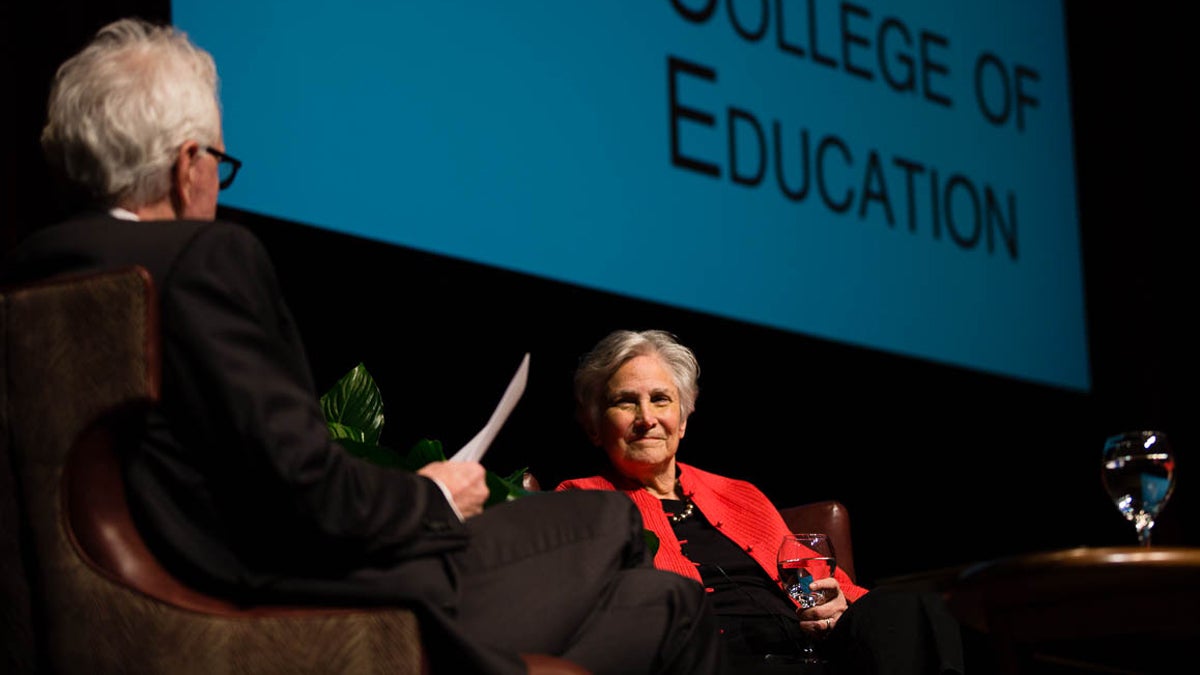Ravitch uses testing as double standard in debate with imaginary education reformer

Education activist Diane Ravitch is shown speaking on Feb. 10, 2015, at Baker Hall, Zoellner Arts Center, Lehigh University. (Christ Neu/Lehigh University)
Recently, I listened to Dr. Diane Ravitch lecture as part of a series hosted by my institution, Lehigh University College of Education. As a former high-ranking member of the U.S. Department of Education, an esteemed educational historian, a staunch advocate of public education, and the author of “Reign of Error: The Hoax of the Privatization Movement and the Danger to America’s Public Schools,” Dr. Ravitch can provide unique insights into educational policy.
Despite her impressive credentials, I had misgivings about attending the lecture. However, faculty at academic institutions carry a responsibility to provide respectful venues for speakers to proffer and defend credible, yet controversial positions. Unfortunately, the substance of Ravitch’s lecture lacked the respect demonstrated by her hosts.
To be fair, common venues of educational policy debate include little decorum or respect. Opinion pages, blogs, and Twitter feeds spice their points of view with vitriol and venom. Commentary about significant educational policies, such as standardized testing and charter schools, focus as much on popular actors as they do about evidence. Unfortunately, sound bites, rather than sound arguments, have become the coin of these realms.
Ravitch constructed her lecture as a debate with a fictitious amalgamation she deemed “Mr. Reformer.” I appreciated her attempt to represent the opposing ideological viewpoint, as well as her admission that she would also get the last word. However, her depiction of Mr. Reformer was superficial at best, disrespectful at worst.
She constructed Mr. Reformer’s position with novice questions and opinions. Her caricature maintained a narrow ideological point of view and offered no evidence. Throughout the lecture, Mr. Reformer served as little more than straw man and straight man. To rebuff Mr. Reformer’s feeble arguments, Ravitch orchestrated poignant one-liners that garnered audience applause.
As she is a formidable scholar and debater, I question why she would not construct an adversary worthy of her time and efforts, not to mention her audience and hosts.
Likely resulting from the ineptitude of her challenger, Ravitch’s remarks routinely omitted pertinent and substantive evidence. For instance, early in her lecture, she cited results from the National Assessment of Educational Progress (NAEP) to demonstrate the current quality of public education in the United States. I agree with her sentiment, but her invocation of NAEP performance excluded critical nuances. Many current NAEP results, as the test is administered at different ages and in different subjects, demonstrate some of the highest performances in the history of the test. Yet, these same NAEP results also report modest to moderately low rates of student proficiency, as well as the continuation (and sometimes worsening) of unacceptable achievement gaps.
Similarly, logical contradictions often ungirded Ravitch’s refutations of Mr. Reformer’s inept protests. In response to Mr. Reformer’s advocacy of accountability and measurement, Ravitch spent considerable time disparaging standardized tests and their use. Yet, in her criticism of Mr. Reformer’s support of charter schools, Ravitch cited the poor standardized test results of many charter schools. In fairness, she criticized charter schools in a multitude of ways.
If Mr. Reformer had been fabricated with a bit more wherewithal, he might have asked Ravitch, “How can you loathe standardized testing, yet cite NAEP results to champion the state of public education? Or point to state administered test results to dismiss the performance of charter schools?”
Despite my troubles with the performance of Ravitch, I would still invite and attend her lecture. Today, individuals interested in educational policy avoid or attack their adversaries, rather than searching for points of cooperation and compromise. I applaud Ravitch’s attempt to include the adversarial point of view, but I suggest she send her antagonist back to school. I happen to know a place where he might graduate to “Dr. Reformer,” but at least learn to make a respectful argument.
—
Craig Hochbein is an assistant professor of educational leadership at Lehigh University’s College of Education.
WHYY is your source for fact-based, in-depth journalism and information. As a nonprofit organization, we rely on financial support from readers like you. Please give today.

